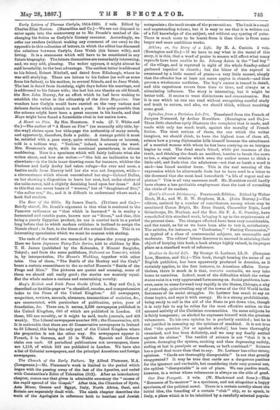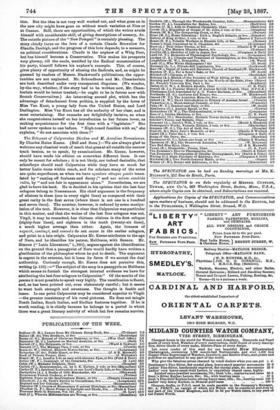Our New Pompeii. 2 vole. (W. Blackwood and Sons.)—This "Romance
of To-morrow" is a specimen, and not altogether a happy specimen, of the political novel. There is a certain novelty about the initial idea, the founding of a certain "club" city, so to speak, in Italy, a place which is to be inhabited by a Carefully selected popula- tion. Bat the idea is not very well worked out, and what goes on in the new city might have gone on without much variation at Nice or at Cannes. Still, there are opportunities, of which the writer avails himself with considerable skill, of giving descriptions of scenery, Ie. The outside picture of the " New Pompeii " is certainly pleasing. The story chiefly turns on the love of a certain Claude Brownlow for Claudia Denbigh, and the progress of this love depends, in a measure, on political considerations. Claude is the nephew of a Whig Peer, but has himself become a Conservative. This makes his prospects very gloomy, till the uncle, terrified by the Radical monstrosities of his party, himself follows his nephew's example. This, of course, gives plenty of opportunity of abusing the Radicals, and, as might be guessed by readers of Messrs. Blackwood's publications, the oppor- tunities are not neglected. Mr. Sehnadhorst and Mr. Chamberlain are both described under very transparent disguises. (We wonder, by.the.way, whether, if the story had to be written now, Mr. Cham- berlain would be better treated,—he ought to be in favour now with Scotch Conservatives.) An interesting second plot, which has the advantage of detachment from polities, is supplied by the loves of Miss Van Kuut, a young lady from the United States, and Lord Darlington. Miss Van Knot has all the audacity of her class, and ie most entertaining. Her remarks are delightfully incisive, as when she congratulates herself on her introduction to her future lover, as making acquaintance for the first time with a "legislator." She had never spoken to one before. "High-toned families with no," she explains, "do not associate with them,"



































 Previous page
Previous page